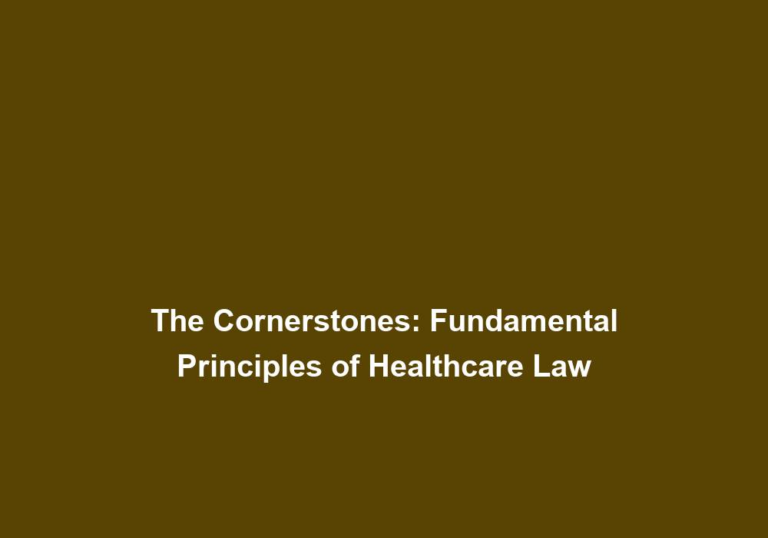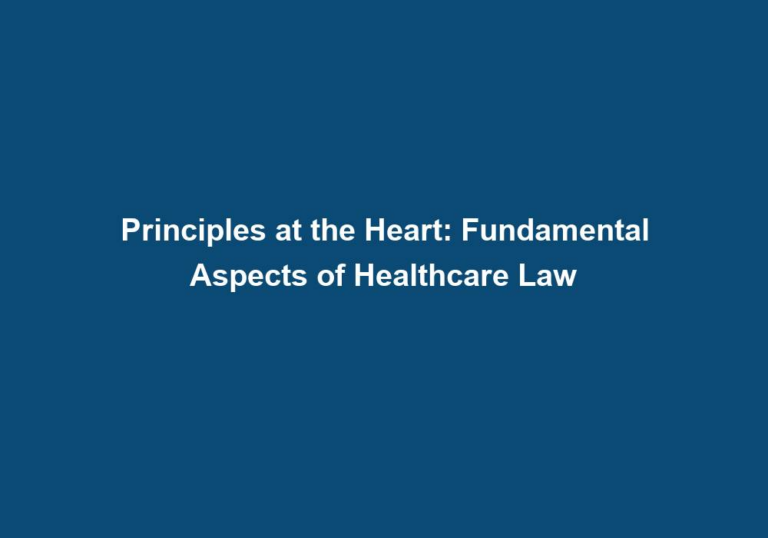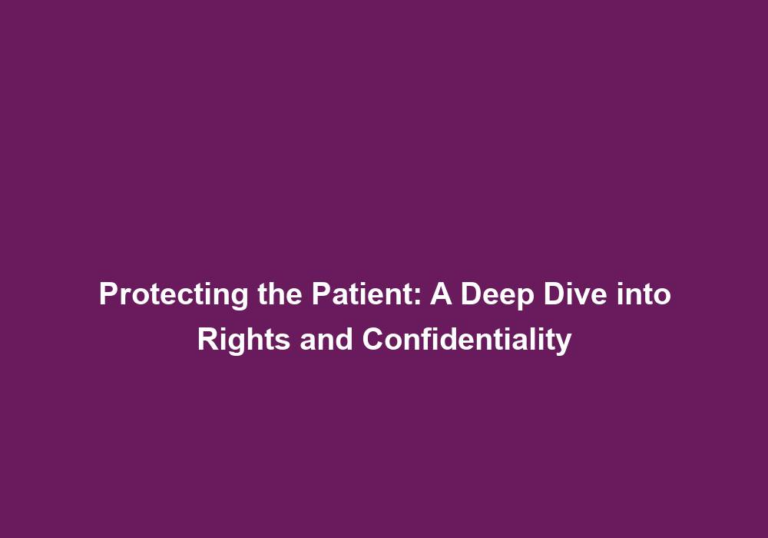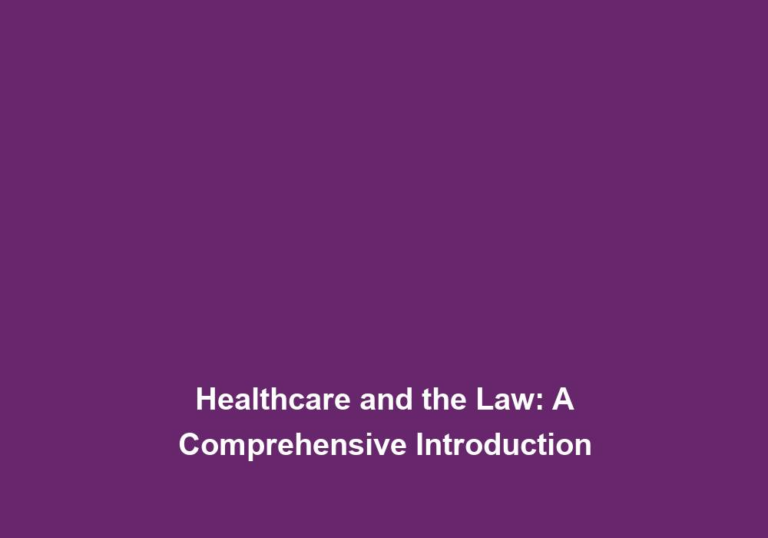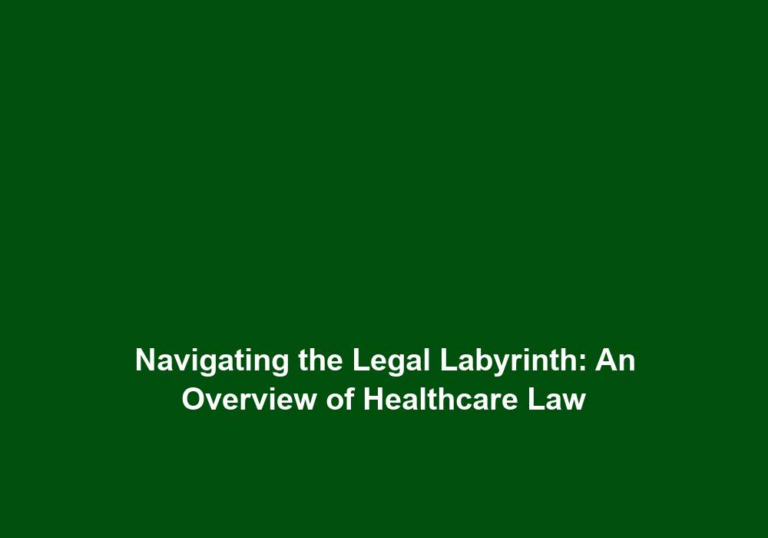Back to Basics: Understanding the Core Principles of Healthcare Law
Healthcare law is a complex and ever-evolving field that governs various aspects of the healthcare industry. It encompasses a wide range of legal and regulatory issues that affect healthcare providers, patients, and other stakeholders. Understanding the core principles of healthcare law is essential for anyone involved in the healthcare sector, from healthcare professionals to administrators and policymakers. In this article, we will delve into the fundamental principles of healthcare law and explore its key components.
1. Introduction to Healthcare Law
Healthcare law, also known as health law, refers to the body of laws and regulations that govern the delivery of healthcare services, the rights and responsibilities of healthcare providers and patients, and the overall management of healthcare systems. It encompasses a broad range of legal topics, including medical malpractice, patient rights, healthcare fraud and abuse, health insurance, and bioethics, among others.
Healthcare law is a multifaceted field that addresses the legal and ethical complexities of providing healthcare services. It sets the standards and guidelines for healthcare professionals to ensure the safety and well-being of patients. These laws also outline the rights and responsibilities of both healthcare providers and patients, aiming to achieve fairness and transparency in healthcare delivery.
2. Key Components of Healthcare Law
a) Medical Malpractice
Medical malpractice is a significant area of healthcare law that deals with the legal liability of healthcare professionals in cases where they fail to provide the standard of care expected of them, resulting in harm or injury to the patient. Medical malpractice cases often involve negligence, improper treatment, misdiagnosis, or surgical errors. Laws regarding medical malpractice vary from one jurisdiction to another, but they generally require the establishment of a duty of care, breach of that duty, causation, and damages.
Medical malpractice laws aim to protect patients from substandard care and ensure that healthcare providers are held accountable for their actions. By establishing the elements necessary to prove a medical malpractice claim, these laws provide a legal framework to seek compensation for damages caused by medical negligence. They also act as a deterrent, encouraging healthcare professionals to adhere to the highest standards of care.
Some key points to consider regarding medical malpractice:
- Medical malpractice laws vary by jurisdiction, but they generally require the plaintiff to prove a duty of care, breach of that duty, causation, and damages.
- Negligence, improper treatment, misdiagnosis, and surgical errors are common examples of medical malpractice.
- Medical malpractice laws provide a legal framework for patients to seek compensation for damages caused by medical negligence.
- These laws also encourage healthcare professionals to provide the standard of care expected of them, promoting patient safety and quality healthcare.
b) Patient Rights
Protecting the rights of patients is a crucial aspect of healthcare law. Patients have the right to receive quality healthcare, access their medical records, make informed decisions about their treatment, and maintain their privacy and confidentiality. Additionally, healthcare providers must obtain informed consent from patients before any medical procedure, ensuring that they fully understand the risks, benefits, and alternatives involved.
Patient rights laws are designed to empower individuals and ensure that they receive proper care and treatment. These laws emphasize the importance of informed consent, allowing patients to actively participate in their healthcare decisions. They also establish guidelines for the privacy and confidentiality of medical information, promoting trust between patients and healthcare providers.
Here are some key aspects of patient rights in healthcare law:
- Patients have the right to receive quality healthcare, access their medical records, and make informed decisions about their treatment.
- Informed consent is a fundamental aspect of patient rights, ensuring that patients are fully aware of the risks, benefits, and alternatives before undergoing any medical procedure.
- Healthcare providers are obligated to protect the privacy and confidentiality of patients’ medical information.
- Patient rights laws aim to empower individuals and build trust between patients and healthcare providers.
c) Healthcare Fraud and Abuse
Healthcare fraud and abuse refer to illegal activities aimed at defrauding the healthcare system or exploiting it for personal gain. Examples of healthcare fraud include billing for services not rendered, upcoding or billing for a more expensive service than provided, kickbacks, and false certification. Healthcare laws have been established to detect, prevent, and prosecute fraudulent activities to protect the integrity of the healthcare system and ensure the proper use of public and private funds.
Healthcare fraud and abuse regulations are crucial in maintaining the integrity and sustainability of the healthcare system. These laws provide mechanisms to identify and investigate fraudulent activities, protecting patients and healthcare providers from exploitation. By establishing penalties and sanctions for offenders, healthcare fraud and abuse laws deter individuals and organizations from engaging in fraudulent practices.
Consider the following points regarding healthcare fraud and abuse:
- Healthcare fraud involves deceptive practices aimed at obtaining financial gain from the healthcare system.
- Examples of healthcare fraud include billing for services not provided, upcoding, kickbacks, and false certification.
- Healthcare fraud and abuse laws aim to detect, prevent, and prosecute fraudulent activities, ensuring the proper use of public and private funds.
- These laws protect the integrity of the healthcare system and safeguard patients and healthcare providers from exploitation.
d) Health Insurance
Health insurance plays a vital role in healthcare law as it affects both patients and healthcare providers. Laws governing health insurance focus on ensuring access to affordable and comprehensive coverage, prohibiting unfair practices by insurance companies, and regulating employer-sponsored health plans. The Affordable Care Act (ACA) in the United States exemplifies a significant legislative effort to expand access to health insurance and protect the rights of consumers.
Health insurance laws aim to provide individuals with access to necessary healthcare services while protecting them from financial burden. These laws establish guidelines for insurance companies, ensuring fair practices and preventing discrimination based on pre-existing conditions. Additionally, they promote transparency in insurance plans, enabling individuals to make informed decisions about their coverage options.
Consider the following key points regarding health insurance in healthcare law:
- Health insurance laws focus on ensuring access to affordable and comprehensive coverage.
- These laws prohibit unfair practices by insurance companies, such as denying coverage based on pre-existing conditions.
- Health insurance laws regulate employer-sponsored health plans, ensuring that employees have access to necessary healthcare services.
- The Affordable Care Act (ACA) in the United States is a significant legislative effort to expand access to health insurance and protect consumer rights.
e) Bioethics and Medical Research
Bioethics deals with the ethical and legal implications of advances in medical technology, research involving human subjects, and the preservation of patient autonomy and dignity. Healthcare laws often address issues such as organ transplantation, end-of-life decisions, genetic testing, and the protection of vulnerable populations. These laws seek to strike a balance between promoting medical progress and ensuring the ethical treatment of patients.
Bioethics laws play a crucial role in guiding medical research and protecting the rights and well-being of individuals participating in studies. They establish ethical standards for the conduct of research, ensuring that participants give informed consent and are not subjected to unnecessary risks. These laws also address sensitive topics such as end-of-life decisions, providing guidelines for the protection of patient autonomy and dignity.
Consider the following key aspects of bioethics and medical research in healthcare law:
- Bioethics laws address the ethical and legal implications of medical advances and research involving human subjects.
- These laws establish guidelines for organ transplantation, end-of-life decisions, genetic testing, and the protection of vulnerable populations.
- Bioethics laws seek to strike a balance between promoting medical progress and ensuring the ethical treatment of patients.
- They provide a framework for the protection of participants in medical research and emphasize the importance of informed consent and patient autonomy.
f) Healthcare Regulations
Healthcare systems are subject to extensive regulations aimed at maintaining safety, quality, and accountability. These regulations can cover areas such as licensing and accreditation of healthcare facilities, standards for healthcare professionals, infection control protocols, and pharmaceutical regulations. Compliance with healthcare regulations is crucial for healthcare providers to maintain the highest standards of care and avoid legal consequences.
Healthcare regulations are essential to ensure the safety and well-being of patients and the quality of healthcare services. These regulations establish standards for healthcare facilities, professionals, and practices, promoting consistency and accountability. By enforcing infection control protocols and pharmaceutical regulations, healthcare regulations protect individuals from preventable harm and maintain public health.
Consider the following key points regarding healthcare regulations:
- Healthcare regulations aim to maintain safety, quality, and accountability in healthcare systems.
- These regulations cover areas such as licensing and accreditation of healthcare facilities, standards for healthcare professionals, infection control protocols, and pharmaceutical regulations.
- Compliance with healthcare regulations is crucial for healthcare providers to maintain the highest standards of care and avoid legal consequences.
- Healthcare regulations protect patients from preventable harm and contribute to the overall well-being of the population.
3. The Role of Healthcare Law in Society
Healthcare law plays a critical role in society by safeguarding the rights of patients, upholding ethical standards, and ensuring the proper functioning of healthcare systems. It provides a legal framework for healthcare providers to deliver safe and effective care while holding them accountable for any wrongdoing. Healthcare laws also serve to protect vulnerable populations, promote public health, and address societal issues related to healthcare access, affordability, and quality.
The role of healthcare law extends beyond individual rights and encompasses the well-being of society as a whole. By establishing guidelines and regulations, healthcare law ensures that healthcare services are accessible, affordable, and of high quality. It also addresses issues of social justice, promoting fairness and equity in healthcare delivery.
In conclusion, understanding the core principles of healthcare law is essential for all stakeholders in the healthcare industry. From protecting patient rights to regulating healthcare providers and insurance companies, healthcare law plays a pivotal role in shaping the delivery and administration of healthcare services. By adhering to these principles, we can foster a healthcare system that is fair, ethical, and accessible to all.


